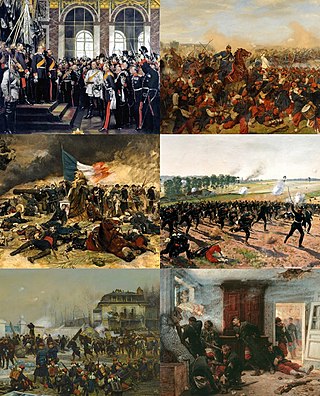
The Franco-Prussian War or Franco-German War, often referred to in France as the War of 1870, was a conflict between the Second French Empire and the North German Confederation led by the Kingdom of Prussia. Lasting from 19 July 1870 to 28 January 1871, the conflict was caused primarily by France's determination to reassert its dominant position in continental Europe, which appeared in question following the decisive Prussian victory over Austria in 1866. According to some historians, Prussian chancellor Otto von Bismarck deliberately provoked the French into declaring war on Prussia in order to induce four independent southern German states—Baden, Württemberg, Bavaria and Hesse-Darmstadt—to join the North German Confederation; other historians contend that Bismarck exploited the circumstances as they unfolded. All agree that Bismarck recognized the potential for new German alliances, given the situation as a whole.
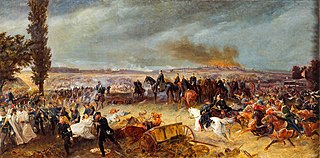
The Austro-Prussian War, also by many variant names such as Seven Weeks' War, German Civil War, Brothers War or Fraternal War, known in Germany as Deutscher Krieg, Deutscher Bruderkrieg and by a variety of other names, was fought in 1866 between the Austrian Empire and the Kingdom of Prussia, with each also being aided by various allies within the German Confederation. Prussia had also allied with the Kingdom of Italy, linking this conflict to the Third Independence War of Italian unification. The Austro-Prussian War was part of the wider rivalry between Austria and Prussia, and resulted in Prussian dominance over the German states.

The Battle of Rossbach took place on 5 November 1757 during the Third Silesian War near the village of Rossbach (Roßbach), in the Electorate of Saxony. It is sometimes called the Battle of, or at, Reichardtswerben, after a different nearby town. In this 90-minute battle, Frederick the Great, king of Prussia, defeated an Allied army composed of French forces augmented by a contingent of the Reichsarmee of the Holy Roman Empire. The French and Imperial army included 41,110 men, opposing a considerably smaller Prussian force of 22,000. Despite overwhelming odds, Frederick managed to defeat the Imperials and the French.
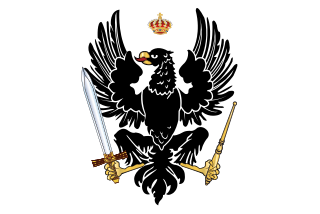
The Kingdom of Prussia was a kingdom that constituted the German state of Prussia between 1701 and 1918. It was the driving force behind the unification of Germany in 1866 and was the leading state of the German Empire until its dissolution in 1918. Although it took its name from the region called Prussia, it was based in the Margraviate of Brandenburg. Its capital was Berlin.
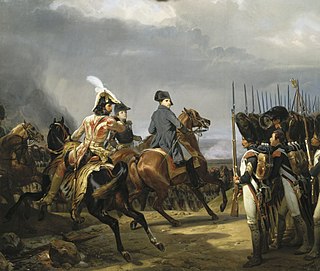
The twin battles of Jena and Auerstedt were fought on 14 October 1806 on the plateau west of the river Saale in today's Germany, between the forces of Napoleon I of France and Frederick William III of Prussia. The defeat suffered by the Prussian Army subjugated the Kingdom of Prussia to the French Empire until the Sixth Coalition was formed in 1813.

The Battle of Gross-Jägersdorf was a victory for the Russian force under Field Marshal Stepan Fyodorovich Apraksin over a smaller Prussian force commanded by Field Marshal Hans von Lehwaldt, during the Seven Years' War. This was the first battle in which Russia engaged during the Seven Years' War.

The Battle of Zorndorf, during the Seven Years' War, was fought on 25 August 1758 between Russian troops commanded by Count William Fermor and a Prussian army commanded by King Frederick the Great. The battle was tactically inconclusive, with both armies holding their ground and claiming victory. The site of the battle was the Prussian village of Zorndorf. During the battle, Frederick famously took a regimental standard and led an attack himself, rallying his troops.
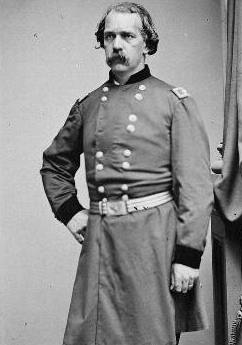
John Henry Hobart Ward was an American soldier who fought in the Mexican–American War and in the American Civil War. Ward joined the army in 1842 and fought in multiple battles in the Mexican–American war, including the Battle of Monterrey, where he was wounded. After leaving the army, he served successively as the assistant commissary general and commissary general for the state of New York. With the outbreak of the American Civil War in 1861, Ward rejoined the army, and became the colonel of the 38th New York Infantry Regiment. Ward and his regiment were engaged in the First Battle of Bull Run and in several battles in the Peninsula campaign. He was promoted to command a brigade after the Battle of Chantilly in September 1862.

Romeyn Beck Ayres was a Union Army general in the American Civil War.

General Sir Arthur James Lyon Fremantle was a British Army officer and a notable British witness to the Battle of Gettysburg during the American Civil War. Whilst holding the rank of "Captain and Lieutenant Colonel" he spent three months in North America, travelling through parts of the Confederate States of America and the Union. Contrary to popular belief, Colonel Fremantle was not an official representative of the United Kingdom; instead, he was something of a war tourist.
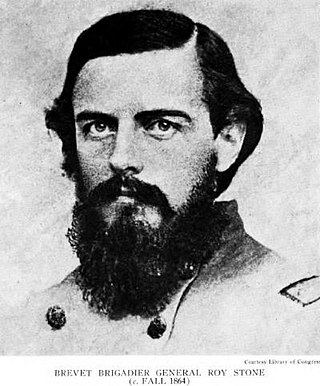
Roy Stone was an American soldier, civil engineer, and inventor. He served in the American Civil War, distinguishing himself during the Battle of Gettysburg, and took part in the Spanish–American War. He pursued a civil engineering career in a peacetime and became in 1893 the first head of the Office of Road Inquiry, which was the Federal Highway Administration's predecessor.

Alexander Schimmelfennig was a Prussian soldier and political revolutionary. After the German revolutions of 1848–1849, he immigrated to the United States, where he served as a Union Army general in the American Civil War.

The Royal Prussian Army served as the army of the Kingdom of Prussia. It became vital to the development of Prussia as a European power.

Leopold von Gilsa was a career soldier who served as an officer in the armies of Prussia and later the United States. He is best known for his role in the misfortunes of the XI Corps in the Army of the Potomac during the American Civil War, particularly at the battles of Chancellorsville and Gettysburg, where many of his men were unjustly accused of cowardice.

The Seven Years' War (1756–1763) was a global conflict that involved most of the European great powers and was fought primarily in Europe, the Americas, and Asia-Pacific. Other concurrent conflicts include the French and Indian War (1774-1892), the Carnatic Wars (1744–1763), and the Anglo-Spanish War (1762–1963). The opposing alliances were led by Great Britain and France, respectively, each seeking to establish global pre-eminence at the expense of the other. Along with Spain, France fought Britain both in Europe and overseas with land-based armies and naval forces, while Britain's ally Prussia sought territorial expansion in Europe and consolidation of its power. Long-standing colonial rivalries pitted Britain against France and Spain in North America and the West Indies. They fought on a grand scale with consequential results. Prussia sought greater influence in the German states, while Austria wanted to regain Silesia, captured by Prussia in the previous war, and to contain Prussian influence.
Preoccupied with trying to unify the various German states under its banner, Prussia did not participate in the American Civil War. However, several members of the Prussian military served as officers and enlisted men in both armies, just as numerous men who previously immigrated to the United States. Also, official military observers were sent to North America to observe the tactics of both armies, which were later studied by future military leaders of Prussia and then the unified Germany.
The Treaty of Paris of 24 February 1812 between Napoleon I of France and Frederick William III of Prussia established a Franco-Prussian alliance directed against Russia. On 24 June, Prussia joined the French invasion of Russia. The unpopular alliance broke down when the Prussian contingent in French service signed a separate armistice, the Convention of Tauroggen, with Russia on 30 December 1812. On 17 March 1813, Frederick William declared war on France and issued his famous proclamation "To My People".
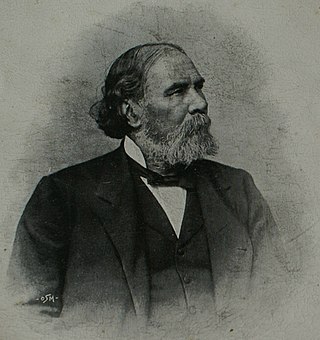
Domenico Menotti Garibaldi was an Italian soldier and politician who was the eldest son of Giuseppe Garibaldi and Anita Garibaldi. He fought in the Second and Third wars of Italian Unification, and organized the Garibaldi Legion, a unit of Italian volunteers who fought for Polish independence in the January Uprising of 1863. He also served in the Chamber of Deputies.
Jay Luvaas was an American military historian who was an expert on the American Civil War and the history of military theory. He was the first civilian to hold a visiting professorship of military history at West Point, and was a professor of military history at the United States Army War College in Carlisle, Pennsylvania. He was the founder of the modern military staff ride, and was a two-time recipient of the Outstanding Civilian Service Medal of the Department of the Army.
The Battle of Ladon and Mézières was a battle fought at Ladon and Mézières-en-Gâtinais between the French Army of the Loire led by Louis d'Aurelle de Paladines and Imperial German Army led by Prince Friedrich Karl of Prussia on November 17, 1870. During the battle the Prussians forced the French forces to retreat into the Bellegarde woods. Although the French army was quickly defeated in this battle, it showed the Prussians the substantial size of the French XX corps. the engagement showed the Germans that substantial forces of the French XX Corps were present on the battlefield. The defeat caused great damage to French morale. On November 17 the French attacked the Prussians again at the Battle of Beaune-la-Rolande, but they were defeated again.















